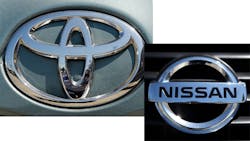Toyota, Nissan to Recall More Than 3 Million More Cars Over Airbags
TOKYO — Toyota and Nissan, Japan’s two top automakers, expanded their global car recall by more than three million vehicles on Thursday in order to replace potentially deadly airbags that have already been linked to eight deaths.
Toyota said it will call back an additional 2.86 million vehicles “equipped with certain front passenger airbag inflators” worldwide, while Nissan said it would recall 198,000 units.
Smaller rival Japanese automaker Mitsubishi also said Thursday it would recall 120,000 vehicles.
Faulty airbags made by Takata have been linked to several deadly accidents, forcing carmakers to recall tens of millions of vehicles and opening the Japanese auto parts maker to a public inquiry by U.S. lawmakers.
Takata chairman and CEO Shigehisa Takada on Thursday apologized for the crisis in his first public appearance since it began.
“I send my deepest condolence to those who died and were injured in accidents due to our company’s inflator,” he said at a news conference in Tokyo. ”I also apologize for all of those affected by (the recalls).”
Takada said studies by his firm and outside labs suggest that humidity and climate are associated with the airbags’ malfunctions.
“We are very sorry. We are doing our best to learn the cause of the problem,” he said.
Tokyo-based Takata last month agreed to double a U.S. recall to a record of more than 30 million vehicles made by some of the world’s bigger automakers.
Before Thursday, Toyota had said 12.66 million of its units have been affected, although Honda, Japan’s No. 3 automaker, has been the hardest hit, with more than 19 million recalled.
The defect — thought to be linked to a chemical propellant that helps inflate the airbags — can cause them to deploy with explosive force, sending metal shrapnel hurtling toward drivers and passengers.
A senior Takata executive told U.S. lawmakers this month that the company was still searching for the main cause of the deadly explosions.
Hours before the additional recalls were reported on Thursday, Takata held a shareholders’ meeting in Tokyo, where executives bowed in apology for the plunging stock price and lack of dividend, according to people who attended.
The company — one of the world’s bigger airbag makers — had originally planned to air the meeting live on the Internet but abruptly cancelled it.
“It wasn’t satisfactory at all. I would give it 50 points out 100,” said shareholder Hiromi Tamura, 60, as he emerged from the closed-door meeting. “There is no clear prospect (for resolution). I don’t think they are confident in themselves, either.”
Another shareholder, 71-year-old Shizuo Sakaguchi, said: “The responses by the company are unacceptable. Many shareholders were asking what specific measures the company is going to take.”
Honda confirmed a new death linked to the exploding air bag crisis on Monday, bringing the global total to eight fatalities.
The company said a woman in Los Angeles died in September last year after the faulty inflator in a 2001 Honda Civic ruptured, firing metal shrapnel at her.
Copyright Agence France-Presse, 2015
About the Author
Agence France-Presse
Copyright Agence France-Presse, 2002-2025. AFP text, photos, graphics and logos shall not be reproduced, published, broadcast, rewritten for broadcast or publication or redistributed directly or indirectly in any medium. AFP shall not be held liable for any delays, inaccuracies, errors or omissions in any AFP content, or for any actions taken in consequence.
